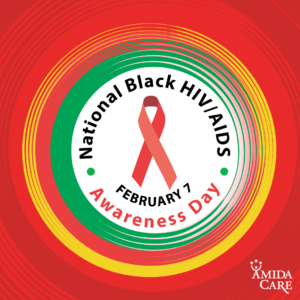National Black HIV/AIDS Awareness Day: Rising to the Challenge

It has been a challenging year for the health of our nation, particularly for communities of color. The COVID-19 pandemic is shining a harsh light on health disparities, especially for Black Americans, who experience serious structural barriers to accessing quality, affordable health care, including discrimination and higher rates of poverty. As noted in Amida Care’s recent report A Pandemic + an Epidemic: COVID-19’s Impact on New York’s Plan to End the HIV Epidemic, Black people represent 28% of COVID-related deaths in New York City, although they account for only 22% of the city’s population. Nationwide, Black people are eight times more likely to be diagnosed with HIV and nine times more likely to die of AIDS than the general population.
Sunday, February 7, is National Black HIV/AIDS Awareness Day, a time to increase awareness, spark conversations, highlight the work being done to reduce new HIV cases in Black communities in the United States, and show support for people living with HIV in these communities.
The most recent statistics from the Centers for Disease Control (CDC) show that African Americans accounted for 42% of new HIV diagnoses, while only representing 13% of the national population. The rate of new HIV diagnoses remains highest among Black men who have sex with men (MSM) and transgender women of color.
Here in New York City, a recent Health Department report shows that while the overall number of new HIV diagnoses continues to decline, the five-year survival probability for those newly diagnosed remains lowest among Black men, and women of color have the lowest survival probability among all female populations. Black transgender people also remain heavily impacted by HIV, with high rates of both new diagnoses and existing cases.
New York State has made great progress toward ending the HIV epidemic, but the coronavirus pandemic has unfortunately disrupted health care in all areas, including HIV testing and treatment. However, we must not lose ground in the treatment and prevention of HIV, especially in communities of color.
What Can Be Done
Public health agencies and providers are revitalizing their efforts to ensure that HIV prevention and treatment remains a priority by focusing on vulnerable communities and by initiating cultural competency and training to better serve Black communities.
There are also steps that individuals can take to protect their health:
Get tested: Everyone should get tested for HIV, but it is particularly important for those placed at elevated risk to get tested more frequently. Free or low-cost tests are available for anyone 12 and older at NYC Sexual Health Clinics, regardless of immigration status. To locate an HIV testing site in New York City, search the NYC Health Map, text “TESTNYC” to 877-877, or call 311.
Visit your primary care physician: Even people who are healthy should regularly seek out primary care and ask their providers questions about sexual health, wellness, and what steps they can take to stay well. If HIV symptoms (fever, swollen glands, muscle aches, tiredness) arise, don’t wait. Seek medical care to be evaluated. The sooner treatment for HIV begins, the better your chances of achieving an undetectable viral load, (U=U), which ensures that the virus won’t be transmitted to others.
Talk to your provider about PrEP: Ask your provider about PrEP (pre-exposure prophylaxis), a highly effective daily pill that drastically reduces the risk of contracting HIV, to find out if it is right for you.
We have an opportunity to refocus our efforts to achieve our goal of ending the HIV epidemic in New York and across the U.S. Working together, government agencies, health plans, providers, and individuals can help achieve an HIV-free future.
Resources
HIV Testing (New York City Department of Health and Mental Hygiene)
HIV Treatment (New York City Department of Health and Mental Hygiene)
